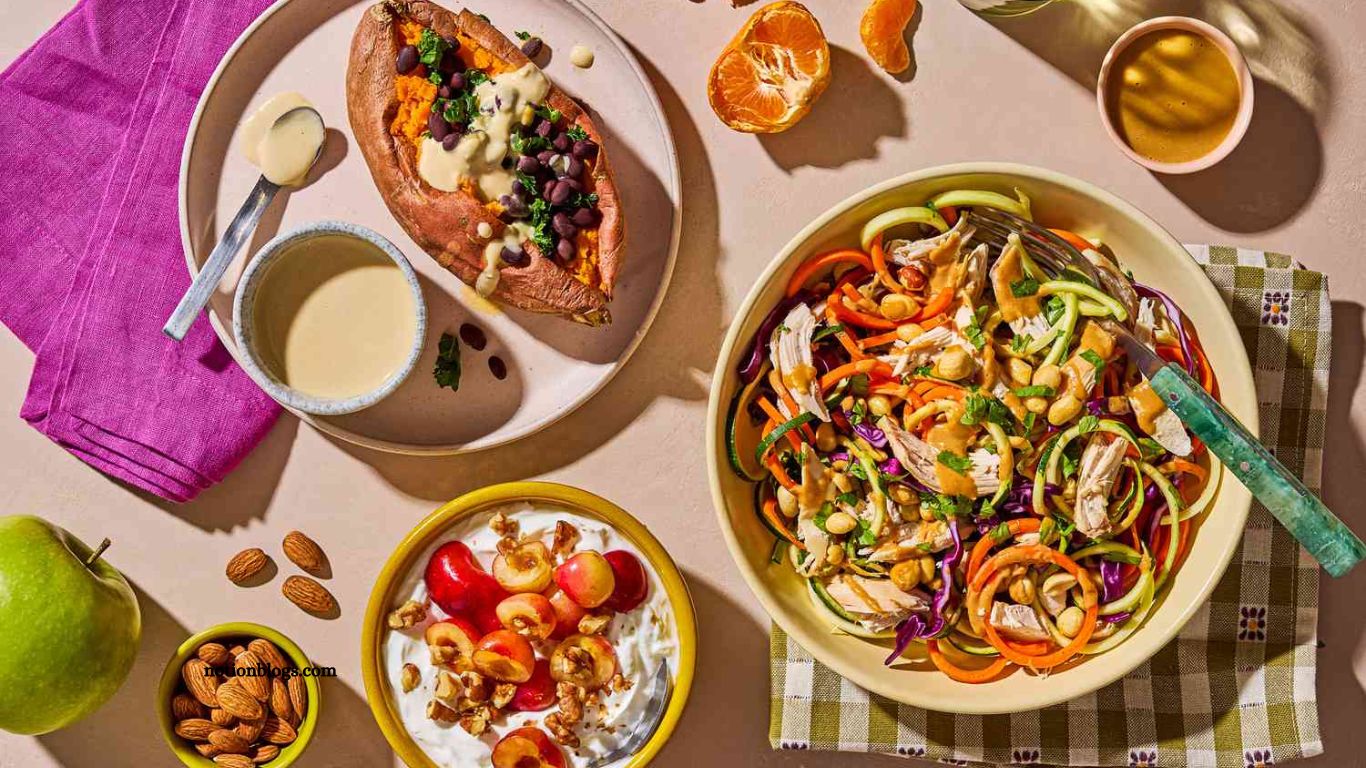Inflammation is your body’s natural immune response to illness or injury. Normally, it’s protective drawing immune cells to the affected area to help speed up healing. However, when inflammation becomes chronic, it can negatively impact your health.
Chronic inflammation has been linked to 7-Day Anti-Inflammatory Meal Plan weight gain, obesity, type 2 diabetes, heart disease, autoimmune disorders, and many other health conditions.
Following an anti-inflammatory diet may offer several health benefits. As always, consult a doctor or healthcare professional before starting any new diet to ensure it’s right for you.
Below is a convenient 7-day anti-inflammatory meal plan, complete with recipe links, to help you get started this week.
Read More: Understanding Weight Loss Struggles: Tips and Support from a Specialist
Day 1
- Breakfast: Superfood kefir bowls with blueberries and coconut
- Lunch: Sweet potato avocado “toast”
- Dinner: Salmon zucchini skewers with cucumber dill sauce
- Snack: Strawberry “granola” snack bowl
Day 2
- Breakfast: Overnight oats with cherries
- Lunch: Lettuce wraps with shrimp, avocado, fresh herbs, and a squeeze of lemon
- Dinner: Cauliflower pizza bake
- Snack: Turmeric latte with a handful of nuts
Day 3
- Breakfast: Raspberry sherbet chia pudding
- Lunch: Coconut basil chicken bowl
- Dinner: Quick chicken stir-fry with broccoli and bok choy
- Snack: Sliced pears with Gouda cheese
Day 4
- Breakfast: Plum, almond, and yogurt parfait
- Lunch: Cobb egg salad
- Dinner: Fish tacos with red cabbage slaw
- Snack: Matcha latte with nut butter on whole grain toast
Day 5
- Breakfast: Acai, cherry, and kale smoothie
- Lunch: Whole wheat pasta salad with chicken (substitute fresh spinach for lettuce)
- Dinner: Grilled steak with roasted butternut squash and a side salad
- Snack: Bottled kefir with a pomegranate
Day 6
- Breakfast: Egg scramble with everything bagel seasoning
- Lunch: Whole wheat sandwich with hummus, turkey breast, and fresh veggies
- Dinner: Autumn-inspired chicken thighs with apples and root vegetables
- Snack: Hibiscus tea with seed crackers and nut butter
Day 7
- Snack: Lacto-fermented pickles and fresh fruit
- Breakfast: Warm fruit salad with almonds and a hint of chocolate
- Lunch: Avocado, tomato, and corn chickpea salad
- Dinner: Almond-crusted trout with shaved Brussels sprout salad
Anti-Inflammatory Cooking Tips
Add herbs and spices.
Herbs and spices not only boost flavor but may also have anti-inflammatory properties. Try turmeric, ginger, rosemary, cinnamon, oregano, cumin, cayenne pepper, and more—don’t be shy about seasoning liberally!
Cook with garlic and onion.
These kitchen staples are rich in antioxidants and anti-inflammatory compounds. They’re easy to add to marinades, salad dressings, bolognese, stews, stir-fries, and many other dishes.
Make your own dressings and marinades.
Combine oil, vinegar, herbs, and spices to create flavorful, anti-inflammatory dressings and marinades—much healthier and more versatile than store-bought options.
Keep it simple.
If juggling complicated recipes every night feels overwhelming, stick to the basics. Pair a protein source like salmon or chickpeas with a vegetable and a grain for a nutritious, anti-inflammatory meal that’s easy to prepare.
Frequently Asked Questions (FAQs)
What is an anti-inflammatory diet?
An anti-inflammatory diet focuses on foods that may help reduce chronic inflammation in the body, such as fruits, vegetables, whole grains, healthy fats, nuts, seeds, and lean proteins. It limits highly processed foods, sugary drinks, and refined carbs.
Can this meal plan help with weight loss?
While the primary goal is to reduce inflammation, many people may also see weight management benefits because the diet emphasizes whole, nutrient-dense foods and minimizes processed options.
Are there any foods I should avoid?
Common foods that may contribute to inflammation include sugary beverages, refined grains, fried foods, processed meats, and excessive alcohol. Moderation is key.
Can I substitute ingredients in the recipes?
Absolutely! Swap ingredients to accommodate allergies, preferences, or seasonal produce. For example, switch salmon for trout, or kale for spinach.
How do I make meal prep easier?
Batch cooking proteins, chopping veggies in advance, and prepping dressings or marinades ahead of time can save time during the week. Simple meals with 3–4 ingredients can also reduce stress.
How long until I see results?
Results vary depending on your health, lifestyle, and consistency. Some people notice improved digestion, energy, or reduced inflammation symptoms within a few weeks, but long-term benefits require ongoing healthy habits.
Conclusion
Chronic inflammation can affect many aspects of your health, but adopting an anti-inflammatory diet may help support your body’s natural healing processes and overall well-being. By focusing on nutrient-dense foods, incorporating herbs and spices, and keeping meals simple yet flavorful, you can enjoy a variety of delicious dishes while nourishing your body. This 7-day meal plan is a practical starting point, but remember: consistency, variety, and listening to your body are key. Pair these meals with regular physical activity, adequate sleep, and stress management for the best results.







